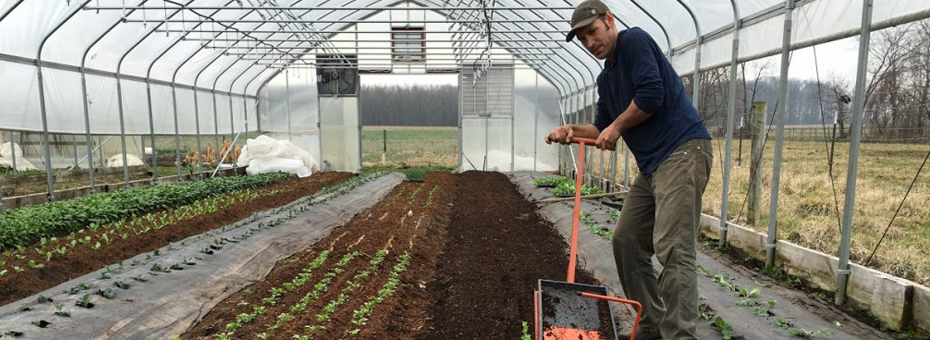Photo courtesy of permaculturevoices.com
Lean is all about doing more with less. It’s a philosophy treasured by industries with traditionally hairline profits – such as farming. After years of trying to make mass production farming work, Ben Hartman of Clay Bottom Farm in Indiana decided to try lean. And in doing so, he drastically increased profits while actually shrinking his acreage. Today, he talks about some aspects of that transformation.
Q: In your book, you explore the differences between growth by expansion versus growth by cost cutting. Can you clarify the difference between the two?
On the farm I grew up on – this was probably a 500-acre corn and soybean farm –the metrics for success were things like, buying a bigger tractor, or buying more land. Farmers were just being told, “Get big or get out.” First the authorities said you need 500 acres to make a viable living; then they said you need 1,000 acres. Now, if you stick to a mass-production model, you definitely do need to be constantly expanding or you’re not going to make it. That’s the expansive way to grow a farm.
There is another way, however, especially with the growth of interest in local foods. It is entirely possible for a farm to get more profitable by becoming leaner. It’s a matter of more precisely knowing what customers want, when they want it, and how much, and by cutting costs. And that’s the approach we’ve taken at Clay Bottom Farm. By building the strength of our operations, we’ve increased profit while decreasing our acreage from five acres to just a half-acre. Our hourly wage has increased every year since we downsized, because we focus on lean improvements that deliver high volumes with less work.
Q: So it sounds like lean is really the only viable option for new farmers?
Basically. Unless they inherit thousands of acres, farmers don’t really have a choice BUT to use a lean model. Profit margins are razor-thin and you won’t be in business for long if you’re just starting out. Most startup farms are out of business within two seasons because they start planting with no lean mindset.
Q: How specifically have you seen the work at Clay Bottom Farm improve since you adopted lean?
The wages, as I mentioned earlier, have gone up every season. Which means we’re spending a high proportion of our time and energy every season on value-adding activities. For us that means we’re making the value of that product go up. So we’re spending more time seeding, harvesting, washing food, and delivering it to our customers in more precise quantities and at more precise times every season. We also have high worker retention – that’s partly due to the way we structure our kaizen process, such that everyone is engaged. I like to use the phrase “Push responsibility down the ladder.” We’re very transparent with our financial transactions, and we like everyone on the farm to be making critical long-term decisions with us.
That high-level engagement has given us happier workers. I would say too that using the 5S system to keep ourselves organized has led to better work and happier workers. We’re not spending as much time looking for those darn hoes or tripping over a lot of tools.
Q: What would you say was your personal favorite lean improvement?
One of the realities about intensive vegetable farming is that people time out – they quit farming – fairly early. That’s because of muri – the work gets more burdensome to do every year, especially if you use the expansion model. You’re going to have more work to do every year.
And so every fall, we ask ourselves, where did we hurt the most this past growing season? Where did we see the most muri? When we were the most overburdened? And then, during the winter, we undergo what we call a muri project – a complex or a simple project that’s going to make our work easier to do the next year. This way, our work gets easier to do every year, not harder.
Just one example is when we had scaled up our carrot production to the point where it was becoming burdensome to harvest them by hand. And so I went to an Amish machine shop, I explained our problem, and he and I designed a carrot-digging implement. It’s a fairly simple tool that mounts behind our small Kubota tractor and lifts the carrots out of the ground and makes it easier for us to harvest.
Q: You share some shocking stats about waste on farms. Clearly that waste affects farmers – how does it impact consumers as well?
We have perhaps the most wasteful food production in the history of the world in the U.S. right now. You almost couldn’t design a more wasteful system. Some say more than half of our food goes uneaten every year, and this is food that’s been packaged and delivered to point-of-use locations. That’s an enormous amount of wasted expenditure.
It’s about the farming industry being stuck with the mass-production model, especially in terms of corn and soybeans. We have a $5 billion farm subsidy package that props up this mass production model, and every year no one seems to know what to do with all the excess. Just here in Indiana, 40% of corn doesn’t get eaten – it goes into ethanol, plastic, corn-based nail polish, or any number of other creative uses designed to sponge up the overproduction.
And consumers pay for all that. Food is artificially cheap in the grocery stores, but we pay for it indirectly through our taxes to subsidize the mass production. And the outrageous healthcare costs in this country are a direct result of our corn and soybean industry. Diabetes – a very expensive disease to treat—is arguably the biggest epidemic of the 21st century, and it’s directly linked to our industrial food-based diet.
Q: As a foodie, I’m aware of (and actively participate in) the current food trend towards natural/organic/local/farm-fresh ingredients. How has lean helped you accommodate those demands?
With a lean approach to farming there’s a lot of money to be made in that trend – especially since most people are now eating most of their meals outside of the home.
So one example: if you’re growing fruits and vegetables there’s an assumption that you’ll rely on a large walk-in cooler. The typical model is you harvest the food in the morning, you stuff it in the cooler, you get on the telephone, you let your vendors know what’s fresh and they buy it if they need it. For years we assumed we had to do that.
But after studying lean, I began to wonder, do we really need a walk-in cooler? Storing food is a risk. It encourages hoarding and inventory waste – our products might become defective by the time we find a market. Plus it’s a lot of motion waste to move crops in and out of coolers.
So we redesigned our harvest and delivery system. We get orders from our vendors via text. Within minutes of getting that order, we go out and harvest the product. We redesigned our farm so we can back our refrigerated delivery vehicle up to the field and harvest directly into it. Within a couple of hours, our customer has their food, freshly picked. Exactly what they wanted, when they wanted it, and the amount they wanted. And as awesome as larger-scale California farmers are, there’s no way that chefs can get a product from California as fast and as fresh as ours.
Q: What are you most looking forward to sharing at the 2018 Lean Transformation Summit?
I’m going to come with a bagful of stories about how we’ve used this fascinating lean system taken from the world of manufacturing and used it to make our small farm very profitable. I hope people leave with an epiphany that lean is a system that applies to literally any size and type of business.
Editor’s Note: Learn more about bringing value closer to your customer from Ben Hartman at the 2018 Lean Transformation Summit, March 26-27 in Nashville. Learn more and register today on the summit webpage.





